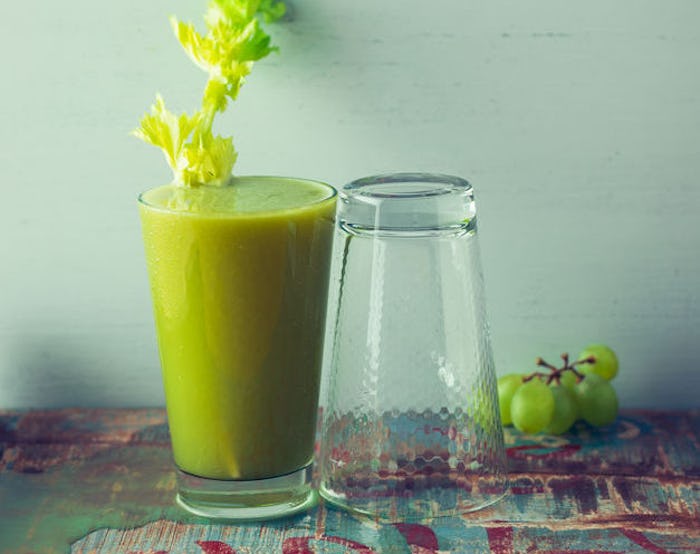Life

Nutritionists Say You Should Actually Be *Eating* Celery, Not Drinking It
Like most people, I'm a sucker for health trends that pop up early in the new year. I find the promise of "new year, new you," oddly reassuring —those toned abs and smaller pores are still possible! So, when I started reading about celery juice, and seeing everyone from celebrities to social influencers jump on the trend, I was jumping, too. But, then I tasted it, and eek. My enthusiasm went down the drain. So I started to wonder if eating celery is as good as drinking celery juice. At least when you eat celery, you can dip it or disguise it.
First, it's important to recognize why people are into this health trend in the first place. It's loaded with vitamins (K and C specificially) as well as potassium, calcium, magnesium, and more, Dr. Gabriella Safdieh, MS, MD of pediatrics and rheumatology wrote on Parsley Health. In addition, "it has a high percentage of water and electrolytes that can help prevent dehydration," she said. Healthline also said that celery juice helps lower blood pressure, prevent chronic illnesses, and has anti-inflammatory properties.
But it turns out that eating celery may actually be better for you than drinking it as juice. Here's why: you get more fiber from eating celery versus drinking it, according to certified dietitian and nutritionist Ilyse Schapiro, MS, RD, CDN, in an interview with Romper. And fiber is the thing if weight loss is one of your motives. "Fiber is one of the reasons why celery helps with weight loss in the first place. Fiber makes you fuller, longer and also contributes to good gut health," explained Today.
Beyond weight loss goals, fiber is essential for an everyday, healthy diet. "I stress the importance of adding fiber to your diet, and including lots of whole or cooked veggies to help add to one’s overall daily fiber intake. Women need 25-28 grams daily and men should have upwards of 35g/daily," according to registered dietitian and nutritionist Dara Godfrey, MS, RD, with RMA of New York, speaking with Romper. I find grams hard to visualize, but 25 grams of fiber is the equivalent of eight bananas or seven cups of blueberries, according to Fiber d’Lish.
Opting to eat celery, instead of juicing it, will help you get more of that good fiber intake, and will help you cut back on your sugar intake.
"I’m against using juice in general for overall health and weight. Even if it’s a veggie juice. Many fruits and vegetables are high in sugars, and when they are juiced, and consumed more quickly, that can spike one’s blood sugar levels and make them ultimately drop sooner, making us crave more sugars in the long term," explains Godfrey.
To get more fiber and less sugar, eating celery is the way to go. But, that can be easier said that done. Celery isn't the sexiest veggie. It's hard to "crave." However, there are some interesting ways you can add flavor to make it seem like more of an enjoyable snack. "Add some natural nut butter (which is a nice protein and a healthy fat), which will satiate you longer term and taste WAY better, advises Godfrey.
So, if you're ready to get your celery on, there is one more important thing to keep in mind. Celery is on the Environmental Working Group (EWG)'s Dirty Dozen, a list of produce high in pesticides. "More than 95 percent of conventional celery samples tested positive for pesticides," explained the EWG.
Therefore, if you're going to be upping your celery intake, or want your kids to get in on munching the green stuff, you'll want to consider your options. "I would buy organic celery to reduce pesticides," advised Schapiro, and always give them a good scrub before consuming.